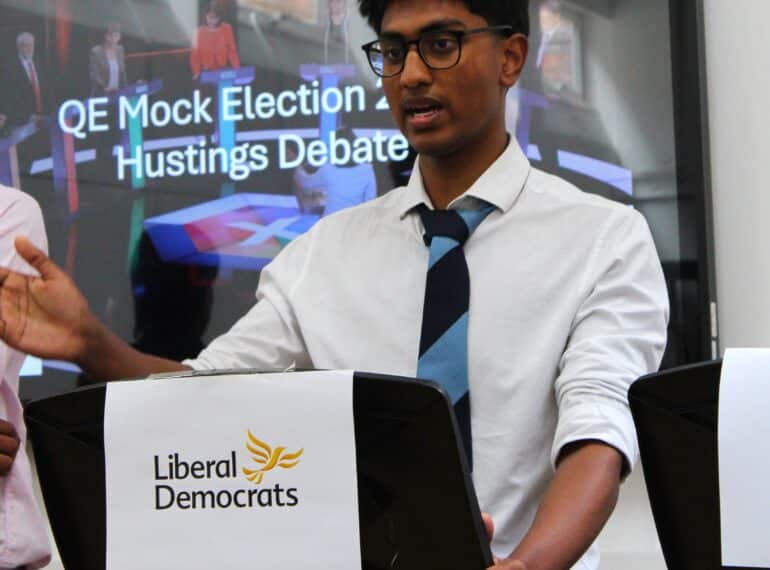
While the country woke up on Friday to news of a Labour landslide in the General Election, at QE the political landscape looks very different, though still with scant consolation for the Conservatives.
 In the School’s mock election, the Liberal Democrats emerged as easily the biggest party, with 21 of the 46 seats in QE’s parliament.
In the School’s mock election, the Liberal Democrats emerged as easily the biggest party, with 21 of the 46 seats in QE’s parliament.
However, since he has no overall majority, the Lib Dems’ Ayaad Salahuddin has already struck a deal with Labour’s Shrey Verma, in second place, so that he can form a coalition government.
Headmaster Neil Enright said: “The mock election seeks to build awareness of the democratic process and get pupils engaged with campaigns, debates, polling and voting. My congratulations go to all the candidates for engaging so enthusiastically in the election process and especially to Ayaad on his victory.”
 The run-up to the mock election included a hustings, where parties made their pitches and fielded questions from the audience. All the candidates were drawn from Year 12.
The run-up to the mock election included a hustings, where parties made their pitches and fielded questions from the audience. All the candidates were drawn from Year 12.
The boys have also been informed by visits in recent months of real politicians from all three leading parties. These were: Sir Vince Cable (former Liberal Democrat Leader and Business Secretary in the Coalition Government); Lord Michael Heseltine (former Conservative Deputy Prime Minister and long-serving Cabinet minister), and Labour’s parliamentary candidate (now new Chipping Barnet MP) Dan Tomlinson, following a previous visit from then local MP Theresa Villiers (Conservative).
Whereas in the country at large, the predictions of the exit poll proved quite accurate, at QE the story was very different: pre-election polling suggested the Conservatives would win, comfortably ahead of Labour, with the Liberal Democrats third. The actual result completely reversed this, giving the Lib Dems 21 seats, Labour 13 and the Conservatives only 7.
John Haswell, Acting Head of History & Politics, said: “The Lib Dems at QE ran a very successful social media campaign and built strong support among the younger year groups, where turnout was also higher.”
 In fact, turnout among Year 7 was easily the highest, at almost 80%. Only small numbers of Year 11 cast votes, having recently completed their GCSEs, while Year 13 have already left (and no postal votes were available). One seat was allocated for each of the 46 forms in the School, excluding forms in Year 13.
In fact, turnout among Year 7 was easily the highest, at almost 80%. Only small numbers of Year 11 cast votes, having recently completed their GCSEs, while Year 13 have already left (and no postal votes were available). One seat was allocated for each of the 46 forms in the School, excluding forms in Year 13.
In contrast to the overall School result, Year 12 gave strong backing to independent candidate Ayan Basharat.
The results were:
- Ayaad Salahuddin – Liberal Democrats – 21 seats (45.6%)
- Shrey Verma – Labour – 13 seats (28.3%)
- Uday Dash – Conservatives – 7 seats (15.2%)
- Arjun Mistry – Green Party – 3 seats (6.5%)
- Rohan Varia – Reform Party – 1 seat (2.2%)
- Ayan Basharat – Independent – 1 seat (2.2%)

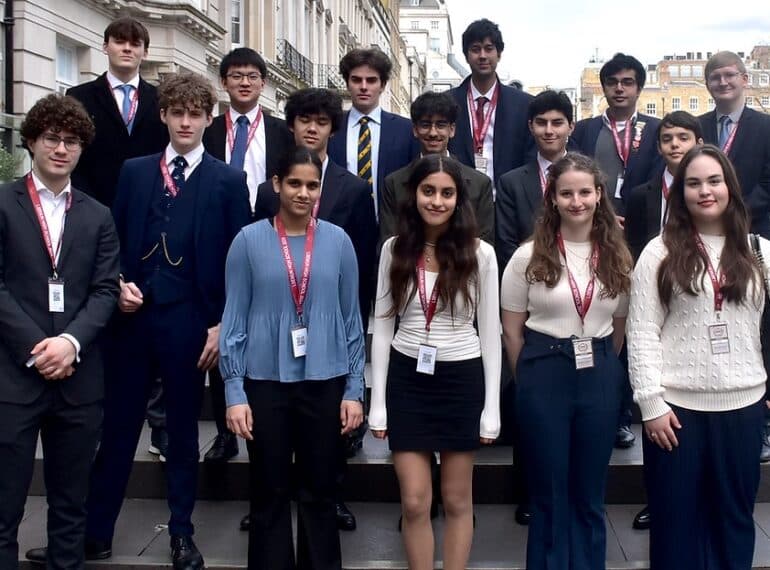
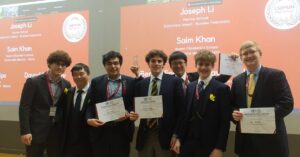 Saim Khan and Chanakya Seetharam were part of a nine-strong group from QE’s Year 12 who took part in the three-day debating event, which simulated the activities of the UN.
Saim Khan and Chanakya Seetharam were part of a nine-strong group from QE’s Year 12 who took part in the three-day debating event, which simulated the activities of the UN.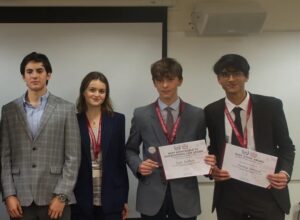 The QE delegates were split among the various committees, including the Security Council. They debated a wide range of topics, including both current conflicts and those of the past, such as the 1956-1957 Suez Crisis.
The QE delegates were split among the various committees, including the Security Council. They debated a wide range of topics, including both current conflicts and those of the past, such as the 1956-1957 Suez Crisis.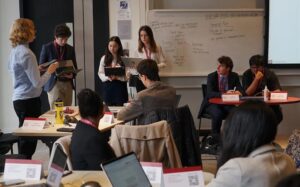 Saim relished his own role representing Malta (“not necessarily the world’s most geopolitically dominant nation”) at MUN. “Whilst I had to work much harder to establish my initial credibility and convince other delegates that the Maltese were even worth listening to, by the end of the three days I can confidently say that Malta had become the leader of the free world.”
Saim relished his own role representing Malta (“not necessarily the world’s most geopolitically dominant nation”) at MUN. “Whilst I had to work much harder to establish my initial credibility and convince other delegates that the Maltese were even worth listening to, by the end of the three days I can confidently say that Malta had become the leader of the free world.”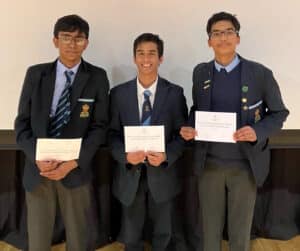 While the group were disappointed to miss out on the award for best medium-sized delegation (which went to Eton), they were, said Uday Dash, “extremely grateful to the conference for providing us with a platform to discuss real socio-economic and political matters that drastically affect our world today”.
While the group were disappointed to miss out on the award for best medium-sized delegation (which went to Eton), they were, said Uday Dash, “extremely grateful to the conference for providing us with a platform to discuss real socio-economic and political matters that drastically affect our world today”.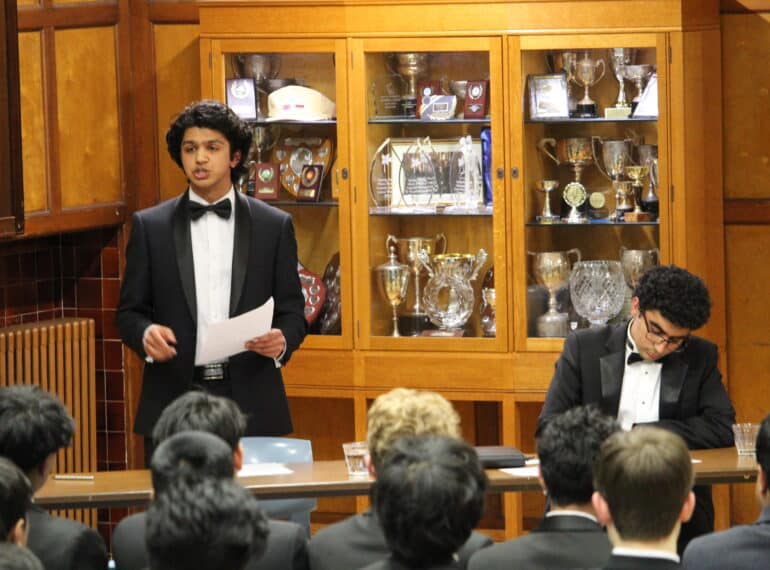
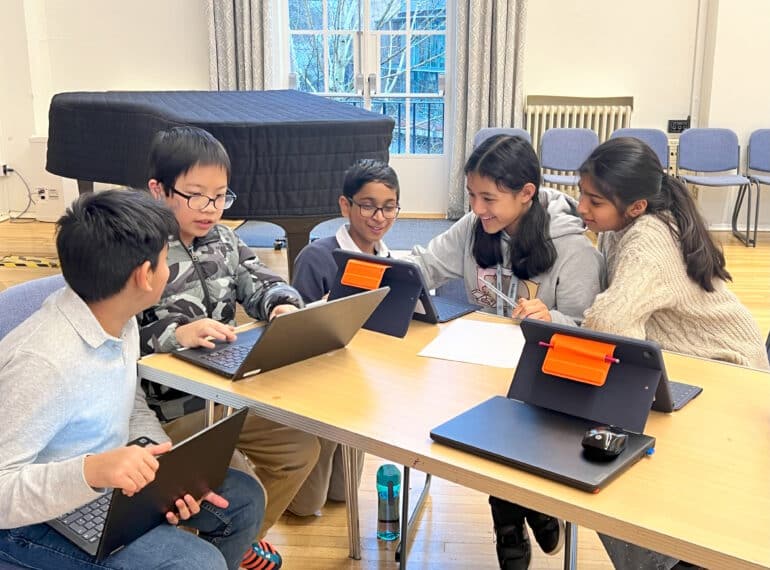
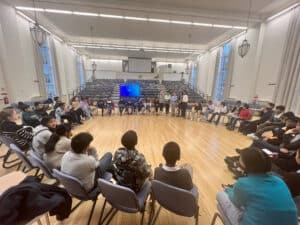 The QE contingent headed to North London Collegiate School for the Year 7 academic symposium, starting the day with a critical examination of social media posts representing different viewpoints and highlighting different scientific data on the atmosphere.
The QE contingent headed to North London Collegiate School for the Year 7 academic symposium, starting the day with a critical examination of social media posts representing different viewpoints and highlighting different scientific data on the atmosphere.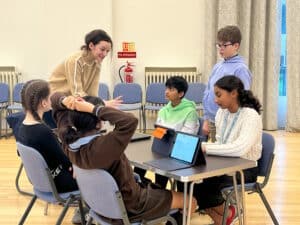 Next, they looked at the impact of different techniques employed in speeches, including the influential contributions made by Thunberg, who customarily challenges world leaders to take immediate action over climate change.
Next, they looked at the impact of different techniques employed in speeches, including the influential contributions made by Thunberg, who customarily challenges world leaders to take immediate action over climate change.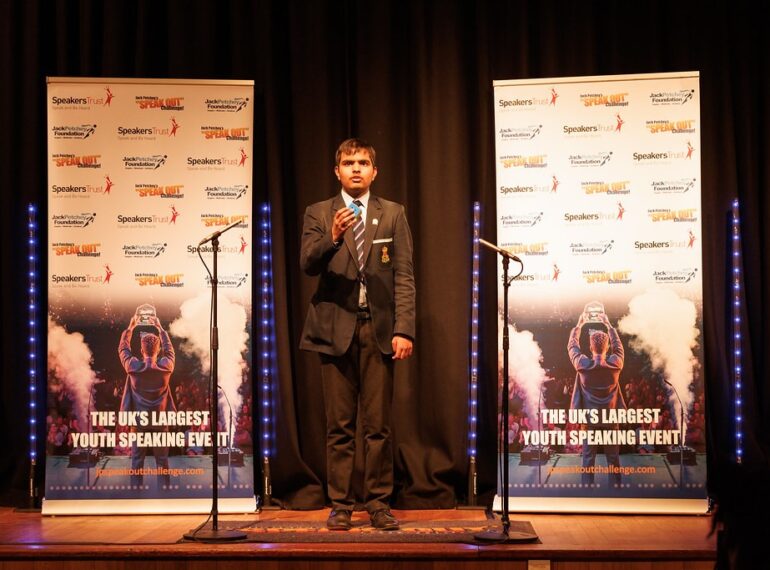
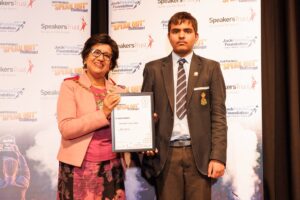 Mohith won his place in the Barnet final of the Jack Petchey Speak Out Challenge by delivering a speech at QE about his determination to up his performance with the Rubik’s cube – all the while actually solving a Rubik’s cube as he spoke.
Mohith won his place in the Barnet final of the Jack Petchey Speak Out Challenge by delivering a speech at QE about his determination to up his performance with the Rubik’s cube – all the while actually solving a Rubik’s cube as he spoke.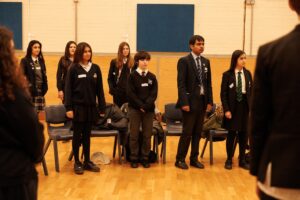 Billed as the UK’s largest youth-speaking event, the Jack Petchey Speak Out Challenge is a programme managed and delivered by Speakers Trust, the UK’s leading public-speaking organisation. It is supported and funded by the Jack Petchey Foundation. Sir Jack Petchey, who is 98 years old, is a businessman and philanthropist who made his fortune in property and timeshare.
Billed as the UK’s largest youth-speaking event, the Jack Petchey Speak Out Challenge is a programme managed and delivered by Speakers Trust, the UK’s leading public-speaking organisation. It is supported and funded by the Jack Petchey Foundation. Sir Jack Petchey, who is 98 years old, is a businessman and philanthropist who made his fortune in property and timeshare.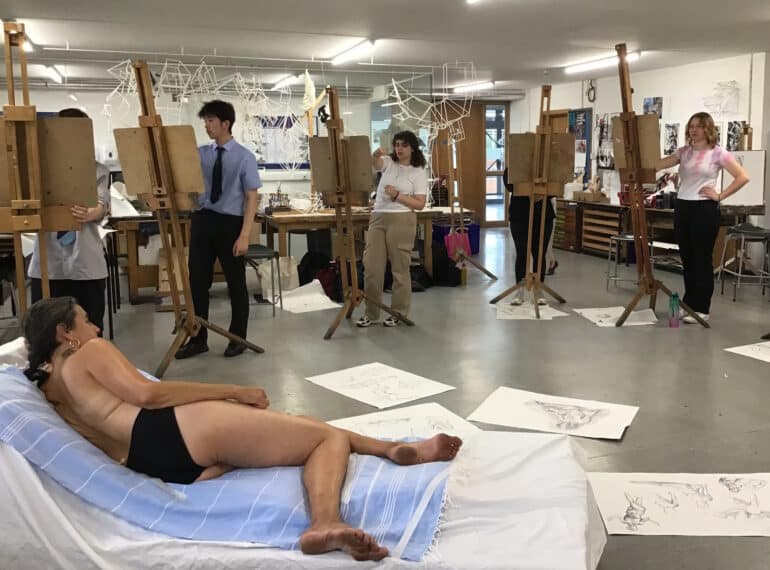
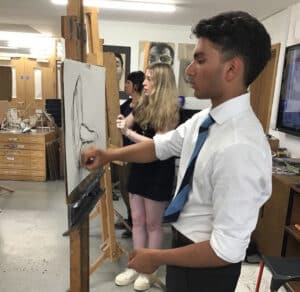 Together with the girls’ participation in filming a promotional video and in a Sketch-off event held as part of QE’s Design Festival earlier in the Summer Term, the life-drawing sessions mark an expansion of the work of the QE Together partnership, which had previously focused on community activities.
Together with the girls’ participation in filming a promotional video and in a Sketch-off event held as part of QE’s Design Festival earlier in the Summer Term, the life-drawing sessions mark an expansion of the work of the QE Together partnership, which had previously focused on community activities.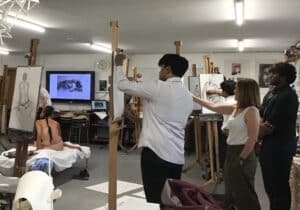 Led by pupils from the two schools, QE Together continued its community activities, with musicians coming together for another concert for care home residents.
Led by pupils from the two schools, QE Together continued its community activities, with musicians coming together for another concert for care home residents. QE Together is one of the newest of QE’s partnerships. The School also has firmly established academic partnerships with North London Collegiate School and The Henrietta Barnett School.
QE Together is one of the newest of QE’s partnerships. The School also has firmly established academic partnerships with North London Collegiate School and The Henrietta Barnett School.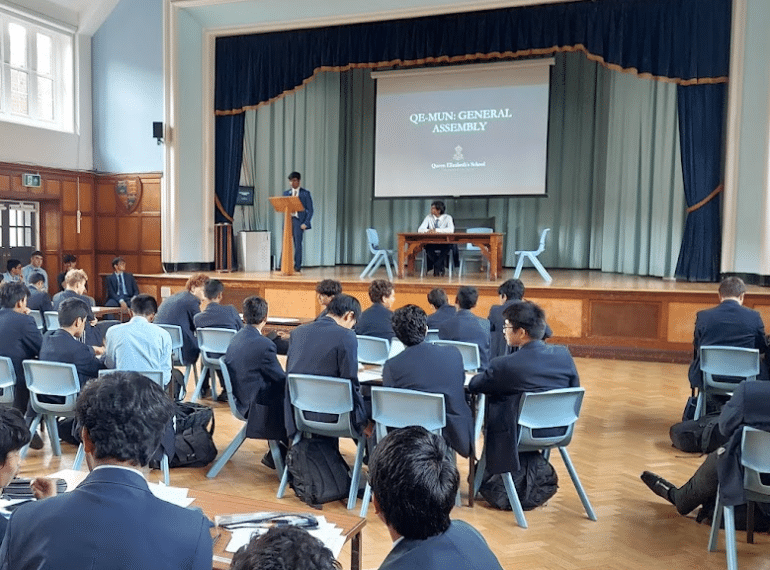
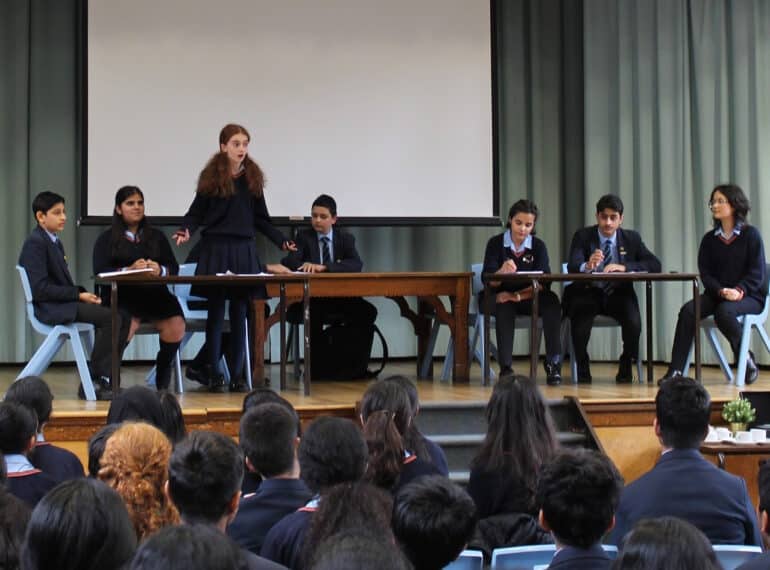
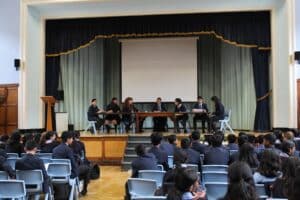 After the initial quickfire rounds, the morning with the guests from The Henrietta Barnett School (HBS) culminated in a final impassioned debate on the motion This House believes it was right to arrest the protesters at the King’s coronation.
After the initial quickfire rounds, the morning with the guests from The Henrietta Barnett School (HBS) culminated in a final impassioned debate on the motion This House believes it was right to arrest the protesters at the King’s coronation.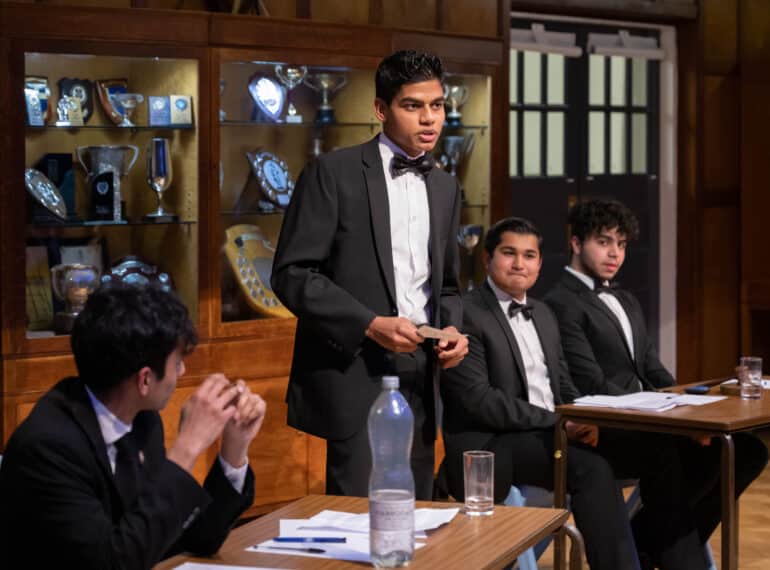
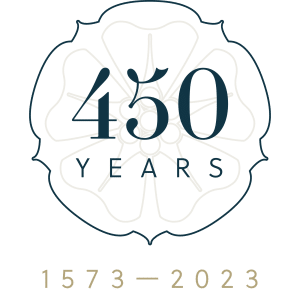 Sixth-formers gathered to take on the visiting Old Elizabethans, debating the motion, This House would leave the past behind us.
Sixth-formers gathered to take on the visiting Old Elizabethans, debating the motion, This House would leave the past behind us.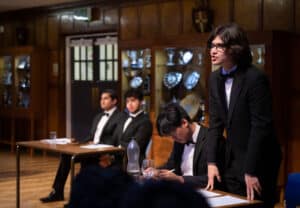 “The dinner participants also made a little bit of history themselves: our 2022 School, Captain Theo Mama-Kahn, led the loyal toast to ‘The King’, rather than ‘The Queen’, for the first time in the Dinner Debate’s history.”
“The dinner participants also made a little bit of history themselves: our 2022 School, Captain Theo Mama-Kahn, led the loyal toast to ‘The King’, rather than ‘The Queen’, for the first time in the Dinner Debate’s history.”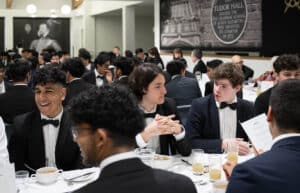 The motion was proposed by the Year 13 pair of Ashwin Sridhar and Sudhamshu Gummadavelly. Opposing it with Saifullah was Mipham Samten (OE 2012–2019). Many Year 13s contributed from the floor.
The motion was proposed by the Year 13 pair of Ashwin Sridhar and Sudhamshu Gummadavelly. Opposing it with Saifullah was Mipham Samten (OE 2012–2019). Many Year 13s contributed from the floor.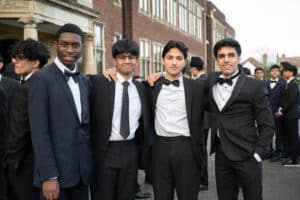 However, at the end of the debate, the proposers’ case had won many over, and the final totals were: 76 for; 55 against; and 39 abstentions. Thus, it was a victory for the School, the Upper Sixth pair successfully convincing people that the past could be left behind, even while its lessons were still being learned.
However, at the end of the debate, the proposers’ case had won many over, and the final totals were: 76 for; 55 against; and 39 abstentions. Thus, it was a victory for the School, the Upper Sixth pair successfully convincing people that the past could be left behind, even while its lessons were still being learned.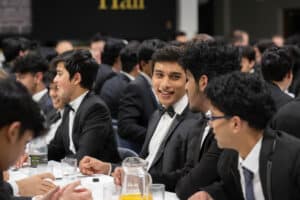 The experience heralded an era of competition success for Saifullah: he has now a record ten mooting and mock trial competitions, and has been a student speaker in six Cambridge Union Debates, the most in recent history.
The experience heralded an era of competition success for Saifullah: he has now a record ten mooting and mock trial competitions, and has been a student speaker in six Cambridge Union Debates, the most in recent history.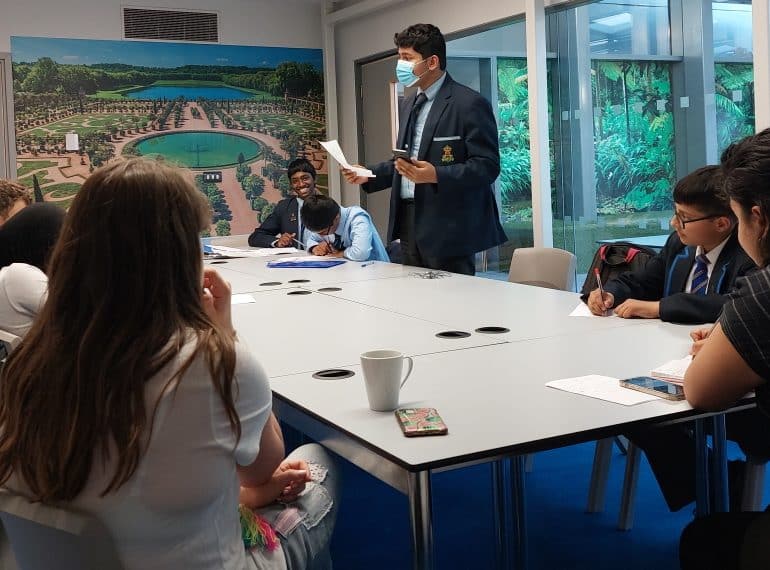
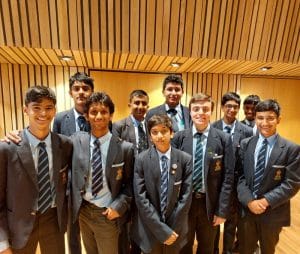 Ten boys went on the trip to the South Hampstead High School (SHHS) Friendly Debating Competition, where they were given only 15 minutes to prepare ahead of each debate.
Ten boys went on the trip to the South Hampstead High School (SHHS) Friendly Debating Competition, where they were given only 15 minutes to prepare ahead of each debate.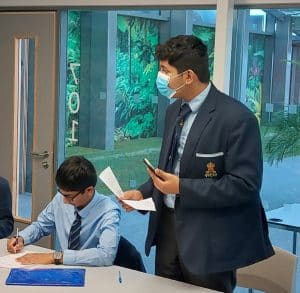 “Logistical issues meant the teams had not been able to practise even once together, while our Key Stage 3 team, drawn from various year groups, had not even met before their first debate, which made the successes even more remarkable.
“Logistical issues meant the teams had not been able to practise even once together, while our Key Stage 3 team, drawn from various year groups, had not even met before their first debate, which made the successes even more remarkable.